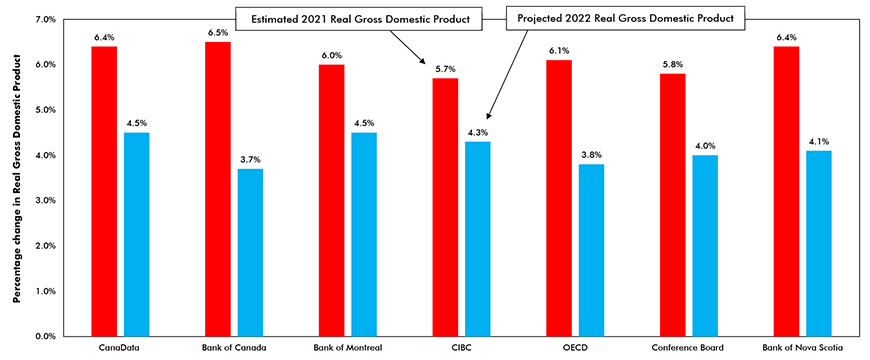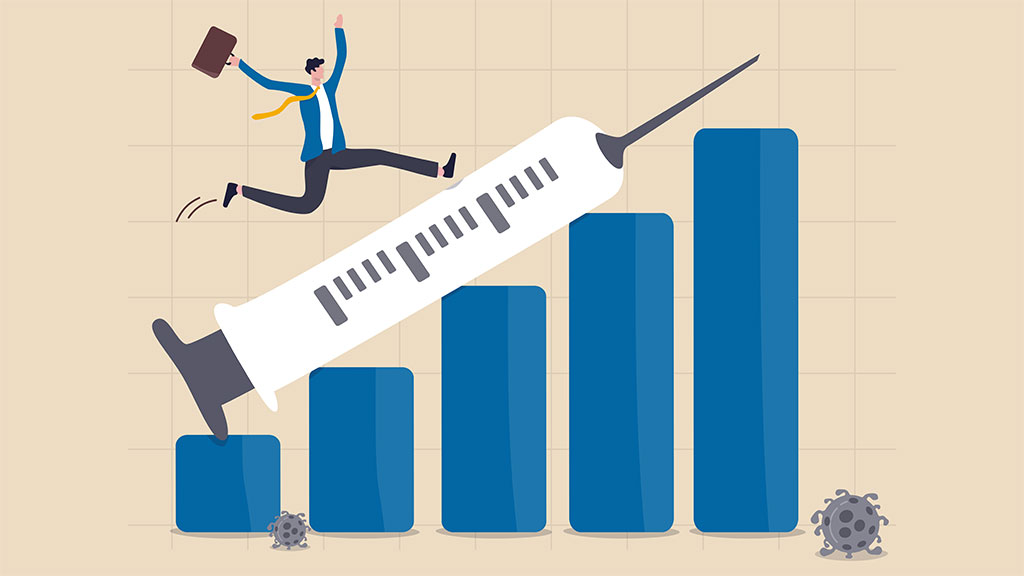Clearly there are lingering COVID-19 clouds overshadowing the global outlook. That said, the combined impact of a flood of vaccines, unprecedented government spending, persisting near record-low interest rates and surging consumer and investor confidence paint a picture of the global economy during the remainder of this year and the first half of 2022 that is much brighter than it was 12 months ago.
This positive outlook for the global economy is echoed by both the International Monetary Fund’s most recent (April) World Economic Outlook and by the OECD in its most recent (May 2021) Economic Outlook. Both organizations have revised their 2021 growth estimates higher as well as their forecasts for 2022. While each of these agencies predicates their upbeat outlooks on the persisting decline in the incidence of COVID-19, they note an increased risk of higher inflation resulting from commodity price hikes and supply bottlenecks in some sectors.
They also suggest that since a large portion of the global population has not yet been vaccinated, the emergence of a new virus variant could cause growth to stall later this year or early in 2022.
A dampening of COVID waves plus government stimulus put the U.S. in overdrive
Fuelled by the combination of a vaccine-induced surge in consumer spending, record low-interest rates and a massive $1.9 trillion coronavirus relief package (approved by President Biden in March) in addition to a $900 billion relief bill (passed by Congress in December), the U.S. economy is approaching the second half of 2021 at full speed.
Over the past 14 months, the U.S. economy has clawed back much of its earlier COVID-related jobs losses, consumer sentiment is up by 22% and the Institute for Supply Management’s Services PMI and Manufacturing PMI are ahead by +13% and +41% respectively.
Since the current recovery is broader and more rapid than previous expansions, many companies are struggling to source critical materials and hire qualified staff. According to the National Federation of Independent Business (from its April 2021 Report), while small business optimism is climbing, 42% of owners are reporting staff openings they cannot fill, a record high.
After a COVID-pause in Q2, expect Canada to head into the remainder of 2021 on a higher note
Although the percentage of the population that is fully vaccinated at 5.7% is significantly below the United States at 40.6% and Europe at 17.0%, the Canadian economy grew by +5.7% in 2021’s Q1 following unsustainably strong gains of +9.3% in Q4 2020 and +41.7% in Q3 2020.
The four dominant contributors to growth in the first quarter were residential construction (+43% q/q), total exports (+6.0%), consumer spending (+2.7%) and government spending (+6.2%). One key sector which did not contribute to growth in the first quarter was non-residential investment, with ongoing weakness in non-residential building and machinery and equipment spending.
After strong gains in February and March, new COVID-19 related lockdowns caused Canadian employment to contract sharply in April and May. As a result, consumer spending and existing home sales backtracked in those two months following strong gains since the beginning of the year. The retreats by these two first quarter drivers will likely stall growth in the second quarter.
Looking ahead, the recent vaccine-driven reopening of economic activity across the country has already sparked a significant increase in consumer confidence that should contribute to a pickup in consumer spending and house sales. In May, the Conference Board of Canada’s index of consumer confidence rebounded by 6.5 points following a lockdown-triggered dip of 6.8 points in April. Fuelled (literally) by the above-noted rebound in U.S. economic activity, merchandise exports — which were up by +34.9% in the first quarter primarily due to a +137% q/q increase in energy exports (i.e., oil and natural gas) — should continue to make a significant contribution to overall growth through the second half of this year and well into 2022.
Key drivers of business investment are flashing green
While it exerted a slight drag on growth in the first quarter, four forward-looking indicators suggest business investment will gain strength through the remainder of this year and beyond. First, following a modest +20% q/q SAAR increase in Q4 2020, after-tax profits of non-financial corporations jumped by +187% q/q in Q1, 2021. Compared to a year ago, they were +115%.
Second, investor confidence as reflected by the S&P/TSX is up by +34% y/y to a record index reading of 20,000. Third, interest rates are expected to remain near zero for the near term. And fourth, the investment intentions of small and medium businesses, as reported by the Canadian Federation of Independent Business, hit a 12-month high in May.
Although the economy was sideswiped by COVID-19 in this year’s second quarter, its strong first-quarter showing and the upbeat outlook for growth in the second half of this year leave our growth estimate for 2021/2020 at +6.4% (versus a contraction of -5.4% in 2020). In 2022 we expect ‘real’ (after inflation) GDP growth in the range of +4.3% to +4.8%.
John Clinkard has over 35 years’ experience as an economist in international, national and regional research and analysis with leading financial institutions and media outlets in Canada.
Comparison of Forecasts of Canadian Real Gross Domestic Product for 2021 and 2022

Conference Board of Canada, Bank of Nova Scotia.
Chart: ɫ��ɫ – CanaData.
Please click on the following link to download the PDF version of this article:


Recent Comments
comments for this post are closed